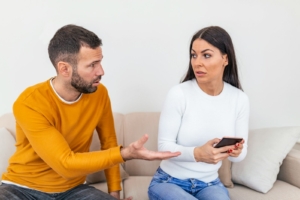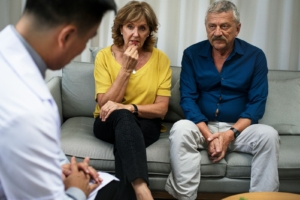Romantic and other relationships exist on a spectrum that runs from healthy and functional, all the way to unhealthy and dysfunctional, or toxic. Each of us gets into relationships with a history that affects how we perceive ourselves and our partners and that history also shapes our expectations and fears about intimacy or communication. That means that in every relationship, there is always room for growth.
Understanding what toxic relationships are
 The word “toxic” communicates that something is unhealthy. It undermines well-being and is destructive. Romans 3:23 (NIV) says that “for all have sinned and fall short of the glory of God”, meaning that none of us is who God created us to be, and we need a radical and gracious work of God in our hearts to begin turning the tide (Ephesians 2:1-10). Our journey is one of growing and learning to overcome the toxic traits we all have in some measure.
The word “toxic” communicates that something is unhealthy. It undermines well-being and is destructive. Romans 3:23 (NIV) says that “for all have sinned and fall short of the glory of God”, meaning that none of us is who God created us to be, and we need a radical and gracious work of God in our hearts to begin turning the tide (Ephesians 2:1-10). Our journey is one of growing and learning to overcome the toxic traits we all have in some measure.
In every relationship that we are in, we tend to bring toxic elements into it. Perhaps it’s a streak of selfishness and competitiveness; it might be our unwillingness to yield ground and apologize; it could be an inappropriate relationship with anger. There is always room to grow. However, in some relationships, these toxic traits form part of the pattern of how to relate to one another, and the relationship itself becomes toxic.
When a relationship is marked largely by these toxic traits of being with others, it’s important to take stock of the situation to understand what’s happened and begin building healthier patterns in the relationship. Every kind of relationship can be toxic, whether parent-child relationships, siblings, coworker relationships, or partners in a romantic relationship.
Instead of being places of nourishment and flourishing, toxic relationships are places of hurt where injury is done to one another. These wounds that are inflicted, whether emotional or physical, affect a person’s well-being, and they diminish the joy and satisfaction to be found in relationships. When our relationships are healthy, that’s a good indicator that we’ll be doing alright, and when they are poor, it’s quite likely that we won’t have deep satisfaction or joy.
Signs of a toxic relationship
 The stakes are high when it comes to our relationships. We are such deeply social creatures, made in the image of our God who is Himself love and is in an eternal relationship – Father, Son, and Holy Spirit (Genesis 1:1; 1 John 4:16; John 1:1). That’s why when our relationships are rich and satisfying, it tends to mean we’ll thrive, even when other areas of our lives aren’t going so well. It helps to know the signs of toxic relationships to address them.
The stakes are high when it comes to our relationships. We are such deeply social creatures, made in the image of our God who is Himself love and is in an eternal relationship – Father, Son, and Holy Spirit (Genesis 1:1; 1 John 4:16; John 1:1). That’s why when our relationships are rich and satisfying, it tends to mean we’ll thrive, even when other areas of our lives aren’t going so well. It helps to know the signs of toxic relationships to address them.
Each relationship will have elements of toxicity in it because we are imperfect people. However, if the relationship runs up regularly against these issues, it is likely the relationship itself is toxic and needs to have the fundamentals addressed. Some of these signs include the following:
The relationship depletes you
There are some relationships in which the interactions leave you feeling exhausted. Good relationships take work, that’s true, but this goes beyond that. It could feel like you’re constantly defending yourself or needing to walk on eggshells around the other person. It’s work that keeps a fragile, but ultimately fruitless and unenjoyable peace.
The relationship is one-sided
In a healthy relationship, there will be some degree of give and take. You may not always have the capacity to bring 100% to the table every time, but because it’s a partnership, you have each other’s back, and you cover each other. It is problematic if the relationship is mostly give or take most of the time from one side or the other.
You’re constantly mired in conflict
Every relationship will experience conflict. People who love each other deeply will still disagree about stuff. However, if you’re caught up in ongoing conflict, or you keep fighting about the same thing and never reach any kind of resolution, that is also a sign of a toxic relationship.
It feels like a competition
In a relationship, loving each other means actively seeking the good of the other, which includes offering support and celebrating successes. In a toxic relationship, it can feel like you’re with a competitor and not a companion. If you succeed, they take it personally or barely celebrate your wins with you. That is quite likely a toxic relationship dynamic.
It doesn’t feel hospitable
A romantic relationship needs vulnerability to function, and that in turn requires a sense of safety, both physical and emotional. A toxic relationship is inhospitable and doesn’t feel like home. It feels unsafe, perhaps because of the tone of voice that dominates the relationship, or perhaps because there is verbal or physical violence. Constant criticism also creates this hostile environment.
Control and manipulation
Love is something that’s given voluntarily. If a relationship contains elements of manipulation, gaslighting, or attempts to control the other person by isolating them from family and other loved ones, it is a sign that the relationship is toxic. Manipulation can happen in various ways, including through shaming, withholding affection, jealousy, or even threatening self-harm.
Romantic love is a beautiful thing, and these relationships have the potential to be enriching and deeply rewarding. There is likely no greater gift you can receive in a relationship than the gift of loving service that seeks your good, and one can’t give a greater gift in return. Toxic relationships undermine the best parts of human relationships, turning those relationships into painful experiences.
How a toxic relationship impacts you
 A toxic relationship has the potential of distorting your understanding of love, and of shifting your expectations of relationships in unhealthy ways. If you get treated poorly consistently, it can affect your self-esteem, and it’s possible to come to the erroneous conclusion that perhaps you deserve to be treated that way.
A toxic relationship has the potential of distorting your understanding of love, and of shifting your expectations of relationships in unhealthy ways. If you get treated poorly consistently, it can affect your self-esteem, and it’s possible to come to the erroneous conclusion that perhaps you deserve to be treated that way.
Toxic relationships can leave you feeling insecure, helpless, anxious, and depressed. Being constantly criticized or belittled affects how a person sees themself, and it can be quite stressful living in an environment where you’re cut off from your emotional support system. Additionally, being in a toxic relationship can affect a person’s ability to form healthy relationships in the future.
A toxic relationship can harm a person long after it has ended. An individual in a toxic relationship is at an increased risk of developing conditions such as depression, post-traumatic stress disorder, substance use disorders, anxiety disorders, and suicidal ideation and suicide attempts. Dealing with a toxic relationship sooner than later helps to mitigate some of these impacts.
Help for couples with toxic tendencies
Toxic relationships involve harmful behavior by one or both partners in the relationship, and so it takes both partners to begin healing and restoring the relationship. If only one partner is willing to put in the work to change the dynamic of the relationship, it’s worth considering leaving the relationship altogether. One person can’t do the work required to bring healing and restoration alone.
When you are in a toxic relationship, the first step is to acknowledge that reality. When you’ve been in a situation for a while, it can feel normal to talk to and be with each other in unhealthy ways. Recognizing how toxic the dynamic is helps you to realize how urgently things need to change, for the better.
You can set boundaries and communicate these clearly to your partner. Boundaries alert the other person to your needs and what you will and will not tolerate in the relationship. They need to be enforced when they are crossed.
Take the time to pursue self-care, whether spending time with loved ones or engaging in activities that allow you to relax and enjoy yourself. Reaching out to loved ones also helps you by re-engaging and strengthening your emotional support system, which is important when you’re going through a tumultuous time.
If it’s called for, plan your exit, and leave the relationship. In cases where the toxic behavior is violence and other forms of harm, leaving the relationship, even temporarily, might be a good next step. Leaving might mean finding a place to stay, getting a restraining order, changing your contact details, and your partner’s ability to access your funds, email, and other accounts. It may also be necessary to cut off contact with them.
Seek help
Talk to a counselor as you think through whether to leave the relationship altogether or as you and your partner work together to fix the relationship. Your counselor will help you better understand the dynamics in your relationship and give you the tools to improve your communication and ability to resolve issues amicably. Couples counseling can help with enhancing your intimacy and moving forward together.
Reach out to our office to speak to a couples counselor today and find out how they can walk with you to heal from a toxic relationship.
“Fight”, Courtesy of Getty Images, Unsplash.com, Unsplash+ License; “Argument”, Courtesy of Getty Images, Unsplash.com, Unsplash+ License; “Devotions”, Courtesy of Priscilla Du Preez, Unsplash.com, CC0 License; “Counseling”, Courtesy of Curated Lifestyle, Unsplash.com, Unsplash+ License









